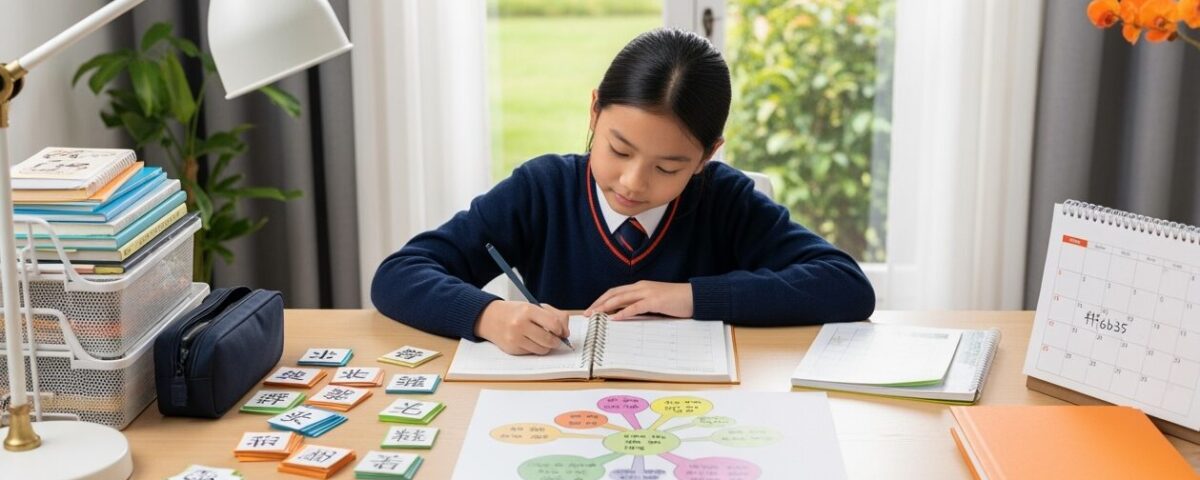
Back to School: How to Help Your Child Get into Exam Mode Quickly
September 8, 2025
PSLE Chinese Oral: 10 Mock Scenarios With Audio To Boost Your Child’s Confidence
October 7, 2025Why September Holidays Are the Perfect Time to Catch Up Before Year-End Exams
Table Of Contents
- Introduction
- Why September Holidays Matter for Academic Success
- Strategic Assessment: Identifying Knowledge Gaps
- Special Focus: Strengthening Chinese Language Skills
- Creating an Effective Study Plan
- Balancing Revision and Rest
- How Parents Can Provide Effective Support
- Conclusion
The September school holidays in Singapore represent a critical juncture in the academic calendar—especially for Primary 1-6 students facing upcoming year-end examinations and, for P6 students, the looming PSLE. While this week-long break offers a much-needed respite from classroom routines, it also presents an invaluable opportunity to consolidate learning, address knowledge gaps, and build confidence before the final academic sprint.
For many students studying Chinese as a second language, this period is particularly significant. The complexity of Chinese character recognition, composition writing, and oral proficiency requires consistent practice and targeted revision strategies. At Seashell Academy by Suntown Education Centre, we’ve observed that students who utilize the September holidays strategically often experience significant improvements in their performance during year-end assessments.
In this comprehensive guide, we’ll explore why September holidays are the perfect time for academic catch-up, how to identify and address learning gaps effectively (especially in Chinese language), and practical strategies for creating a balanced revision plan that prepares students for success without overwhelming them.
Why September Holidays Matter for Academic Success
The September holidays occupy a strategic position in the academic calendar that makes them particularly valuable for exam preparation. Here’s why this brief break represents a golden opportunity for students:
Perfect Timing: With approximately 8-10 weeks remaining before year-end examinations, the September break provides sufficient time to address weaknesses while still allowing for implementation of new learning strategies. This timing creates what educational psychologists call the “optimal intervention window”—not too early that concepts might be forgotten, yet not too late that intervention becomes ineffective.
Reduced Pressure Environment: Unlike the intensive June holidays when students may be recovering from mid-year examinations, or the last few weeks before final exams when anxiety levels peak, September offers a relatively pressure-free environment for meaningful learning. This psychological space allows for deeper engagement with challenging subjects like Chinese language.
Opportunity for Personalized Focus: By September, teachers have covered approximately 75-80% of the annual curriculum. This means students have a substantial body of knowledge to review, making it an ideal time to identify and address specific learning gaps rather than attempting to cover vast new material.
Building Momentum: Strategically using the September break helps create positive academic momentum heading into the final term. This psychological boost can significantly impact a student’s confidence and performance in the crucial weeks leading up to year-end examinations.
Strategic Assessment: Identifying Knowledge Gaps
Before diving into intensive revision, it’s crucial to conduct a comprehensive assessment to identify specific areas requiring attention. This targeted approach is far more effective than general revision across all topics:
Review Past Papers and Tests: Systematically analyze your child’s performance in school assessments from Terms 1-3. Pay particular attention to pattern errors rather than isolated mistakes. For Chinese language, common patterns might include consistent errors in character stroke order, difficulty with specific grammar structures, or challenges with comprehension question types.
Subject-Specific Diagnostics: For Chinese language specifically, evaluate performance across the four key components: listening comprehension (听力), oral communication (口试), composition writing (作文), and comprehension and language use (理解与语文运用). This compartmentalized approach allows for more targeted intervention.
Self-Assessment Questionnaires: For older students (P5-P6), encourage self-reflection on perceived strengths and weaknesses. Questions like “Which types of Chinese comprehension questions do you find most challenging?” or “What aspects of composition writing make you feel uncertain?” can reveal valuable insights that formal assessments might miss.
Consultation with Teachers: September is an excellent time to schedule consultations with school teachers or tuition centers like Seashell. Professional educators can provide objective assessments of a student’s current standing and offer specific recommendations for the final term.
Special Focus: Strengthening Chinese Language Skills
Chinese language learning presents unique challenges for many Singaporean students, making it an area that particularly benefits from focused attention during the September holidays. At Seashell Academy, we’ve developed specialized approaches that yield significant results when implemented during this critical period:
Word-Root Mapping for Character Mastery
One of the most effective techniques for rapidly improving Chinese character recognition and retention is word-root mapping (词根教学法). Unlike traditional rote memorization, this approach helps students understand how Chinese characters are constructed, creating meaningful connections that facilitate both recognition and writing:
Component Analysis: Break down complex characters into their constituent parts, identifying semantic (meaning) and phonetic (sound) components. For example, the character 清 (qīng, clear) combines the water radical 氵with the character 青 (qīng, blue/green), logically suggesting “clear like water.”
Character Family Grouping: Organize characters that share common roots or components. For instance, characters containing the heart radical 心 often relate to emotions: 思 (thinking), 怕 (fear), 愛 (love). This systematic grouping dramatically improves retention and recall.
September Holiday Application: The week-long break provides sufficient time to master 20-30 new character families, significantly expanding vocabulary while strengthening understanding of character construction principles. At Seashell’s P4 Chinese Programme, P5 Chinese Programme, and P6 Chinese Programme, we provide structured word-root mapping exercises tailored to each level’s curriculum requirements.
Mind-Mapping for Composition Excellence
Composition writing (作文) often poses the greatest challenge for Chinese language learners. Our experience at Seashell shows that mind-mapping techniques (思维导图辅助记忆) can transform this challenging aspect of Chinese language learning:
Visual Organization: Create branching diagrams that organize ideas for compositions, linking main themes to supporting details and appropriate vocabulary. This visual approach helps students plan coherent compositions with logical progression.
Vocabulary Integration: Incorporate newly learned phrases and idioms directly into mind maps, creating immediate contextual applications. This bridges the gap between passive vocabulary knowledge and active usage in composition.
September Holiday Strategy: Use the break to develop 3-5 comprehensive mind maps covering common composition themes like friendship (友情), perseverance (毅力), or environmental protection (环保). These prepared mental frameworks provide valuable scaffolding for year-end examination compositions.
Our programme philosophy at Seashell emphasizes these research-backed techniques that transform abstract concepts into visually accessible learning tools, making Chinese language acquisition more intuitive and engaging.
Creating an Effective Study Plan
The effectiveness of September holiday revision depends largely on thoughtful planning. Here’s how to create a structured yet flexible study plan that maximizes learning without causing burnout:
Realistic Time Allocation: For primary school students, we recommend 2-3 hours of focused study daily during the September break, with Chinese language receiving proportionally more time if it’s an area of concern. This moderate approach prevents overwhelming students while still allowing for meaningful progress.
Topic Prioritization: Allocate revision time based on three factors: difficulty level, examination weighting, and current proficiency. For Chinese language, this might mean dedicating more time to composition writing (作文) which typically carries significant marks and requires complex skills.
Interleaved Practice: Rather than blocking entire days for single subjects, alternate between different subjects and components within subjects. For example, a morning session might focus on Chinese character learning, followed by Mathematics in the afternoon, and returning to Chinese comprehension in the early evening. Research shows this approach enhances long-term retention.
Strategic Scheduling: Schedule the most challenging topics during your child’s peak mental performance hours. For most children, this is typically in the morning between 9-11 AM or after a short afternoon rest between 3-5 PM. Reserve passive review activities for lower-energy periods.
Balancing Revision and Rest
Effective holiday revision isn’t about maximizing study hours—it’s about optimizing learning efficiency while ensuring proper rest. This balance is particularly important for maintaining positive associations with challenging subjects like Chinese language:
Structured Breaks: Implement the Pomodoro Technique or similar time-management methods—25-30 minutes of focused study followed by a 5-minute break, with longer breaks after completing four cycles. This rhythm maintains attention and prevents diminishing returns from extended study sessions.
Physical Activity Integration: Schedule daily physical activities like swimming, cycling, or simply playing outdoors. Physical exercise improves cognitive function, enhances memory consolidation, and reduces stress—all critical factors for effective learning.
Cognitive Variety: Alternate between different types of learning activities to prevent mental fatigue. For Chinese language, this might mean switching between character writing practice, comprehension exercises, oral practice, and listening activities rather than focusing exclusively on one component for extended periods.
Quality Family Time: Reserve dedicated periods for non-academic family activities. These breaks not only provide necessary mental refreshment but can also incorporate informal language practice—perhaps watching a Chinese language family movie or visiting cultural destinations that stimulate interest in Chinese heritage.
How Parents Can Provide Effective Support
Parental involvement significantly influences the effectiveness of holiday revision, particularly for primary school students. Here are practical ways parents can support their children’s learning during the September break:
Create an Optimal Learning Environment: Designate a quiet, well-lit study space free from distractions. Ensure all necessary materials are accessible, including appropriate Chinese dictionaries, assessment books, and past papers. A properly organized physical environment minimizes wasted time and maximizes focus.
Monitor Without Micromanaging: Strike a balance between providing structure and fostering independence. For younger students (P4), closer supervision may be necessary, while older students (P5-P6) benefit from greater autonomy with periodic check-ins on progress.
Incentivize Progress: Establish small, meaningful rewards for achieving specific learning goals. These might include special activities, modest treats, or additional recreational time. Importantly, focus rewards on effort and improvement rather than perfect performance.
Model a Positive Attitude: Children are highly responsive to parental attitudes toward subjects like Chinese language. Demonstrate interest in what they’re learning, practice using Mandarin at home when possible, and frame challenges as opportunities for growth rather than obstacles to overcome.
Seek Professional Support When Needed: If specific learning challenges emerge during the holiday revision period, consider targeted professional assistance. Specialized programs like those offered at Seashell Academy can address specific weaknesses with proven methodologies tailored to individual learning needs.
Conclusion
The September holidays represent a pivotal opportunity in the academic calendar—a strategic pause that, when utilized effectively, can significantly impact year-end examination performance, particularly in challenging subjects like Chinese language. By implementing thoughtful assessment strategies, focusing on areas of greatest need, applying specialized learning techniques like word-root mapping and mind-mapping, and maintaining a healthy balance between revision and rest, students can transform this brief break into a powerful academic catalyst.
At Seashell Academy, we’ve witnessed countless students use this period to overcome plateaus in their learning, developing not only stronger academic skills but also greater confidence and a more positive relationship with their studies. While the September holidays may be brief, their potential impact on academic outcomes and learning attitudes can be both profound and lasting.
As year-end examinations approach, remember that effective preparation isn’t about dramatic last-minute efforts but rather strategic, consistent progress built on understanding individual learning needs and addressing them with proven methodologies. The September holiday revision period, when approached with clarity and purpose, provides the perfect opportunity to establish this foundation for success.
Ready to help your child make the most of the September holidays and prepare effectively for year-end examinations? Contact Seashell Academy today to learn more about our specialized programs designed to transform learning through innovative, proven methodologies. Book a consultation with our experienced educators to discover how we can support your child’s journey to academic mastery and PSLE success.



